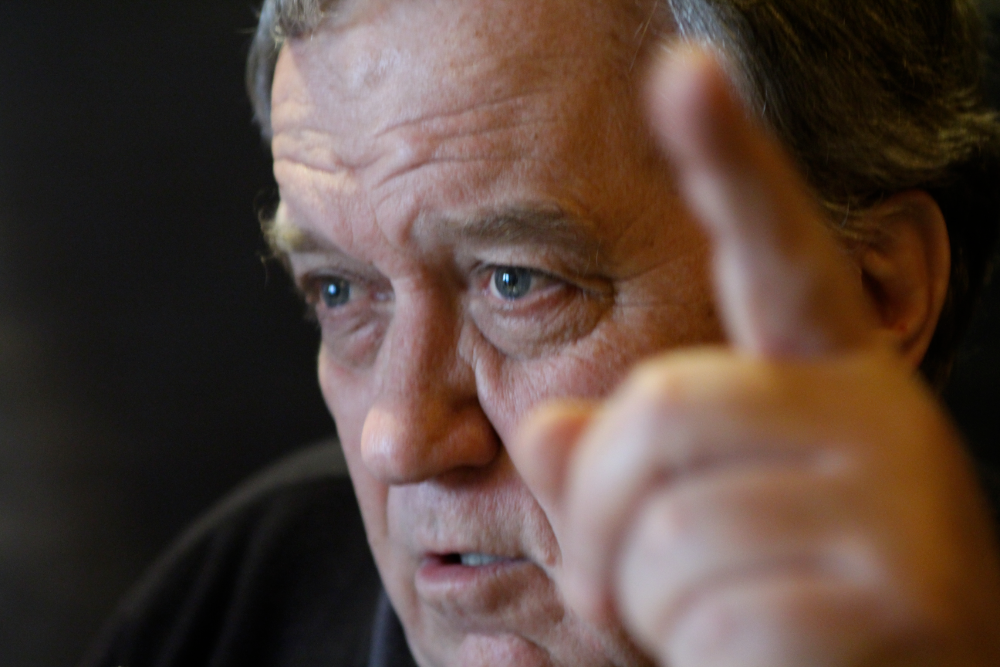
Zlatko Dizdarević (Photo Dado Dizdarević)
Commemorating the centennial of the outbreak of World War I in Sarajevo is an expression of cynicism, according to journalist and writer Zlatko Dizdarević*
In June, Europe will remember the centennial of the start of the First World War with a packed program of initiatives in Sarajevo. What do you think of these celebrations?
They are an expression of cynicism. They are initiatives that will certainly not work to the advantage of Sarajevo, nor of its inhabitants. Moreover, they’ve re-opened a battle among us over Gavrilo Princip. Today, for about half of the Bosnians Princip is a terrorist. For the other half, he is a hero. Why do we need to discuss these things now? We have a country, Bosnia-Herzegovina, that is completely destroyed. It doesn’t function. It does not exist. And Europe’s politicians will come here smiling for a week, with colorful balloons and grandiose declarations, “Never Again,” to remember Europe’s love for Sarajevo and European principles. It speaks to an incredible cynicism. If there is a place where European principles have been abandoned, it is Sarajevo.
Then why this celebration?
It’s a wonderful occasion to launder the conscience, to organize something positive, an enormous party, in a moment in which the European and global situation is dramatic, with war ever more present, the extreme right growing stronger, and the progressive abandoning of the ideas of freedom and cosmopolitanism.
Nonetheless the death of Franz Ferdinand signaled the end of an era, and the beginning of Europe’s great civil war. Isn’t it important to remember these events?
First of all, I do not believe that the war was initiated in Sarajevo. The great powers were already preparing for the war. Sarajevo is not responsible for the war.
The assassination was only a pretext?
Sarajevo was the victim of the existing international relations. In the last conflict, its destiny was the same. The fault did not lie with Sarajevo. In 1992, when the war began, not one of us thought that it was possible. The atmosphere, the relations between the persons, did not even allow for the thought. After the first bloodletting, naturally, the situation changed.
So it is not necessary to re-open the debate around these topics?
I do not believe that it is necessary now, and all the less so in Sarajevo. The nationalism, the history of the last 20 years, all of the unresolved problems... Sarajevo is not the right place to have these celebrations. In our elementary schools, we have history books that present three different versions of this episode. How can we possibly discuss it? Why did they not plan these celebrations in Paris, London or New York? I am not against a small demonstration, a commemoration, or an exhibit. Obviously we cannot close our eyes before this anniversary. But what is happening is simply overwrought.
How so?
The expressions of cultural life, from the cinema to the theater, all the literature, all the sporting events, everything is taking place in the context of the First World War. The French Embassy proposed a Tour de France that begins in Sarajevo in the name of the centennial. All of this cynical. It happens so as to forget the reality of Bosnia-Herzegovina today. A reality that no one wants to confront. There is a lot of rhetoric and falsehood in these celebrations. People in Sarajevo are not interested. This is not our celebration.
Has the theme of June 28 already produced discord?
In reality, the citizens are simply tired of these debates. They spend their time trying to find something to eat, or a job. Sarajevo is weary of these European promises that are regularly ignored. Twenty years ago I wrote a book with a friend, Gigi Riva, entitled, “The UN died in Sarajevo.” Today, twenty years later, I think that it is in fact Europe that died in Sarajevo.
Why didn’t the local cultural and political institutions prevent this celebration if the effects are so negative?
Because they are under the pressure of the diverse international institutions, the various European offices, and the non-governmental organizations…. All of them are in exaltation over this event, they are in ecstasy. The reality, however, is that Europe is divided even today, between East and West, between Slavic Europe and Austro-Hungarian Europe.
So the situation today is not much different than it was a hundred years ago?
Absolutely not. Look at the Ukraine, look at Syria. They are the products of imperial dreams, of neo-colonial ambitions.
And Bosnia-Herzegovina?
If absolutely clear signs are not presented about the European future of Bosnia, the space will be occupied by other powers, by Turkey, by Russia, or by the Arab Gulf States.
*Zlatko Dizdarević is a journalist and writer from Sarajevo. He was the Ambassador for Bosnia-Herzegovina in Croatia and in the Middle East.






